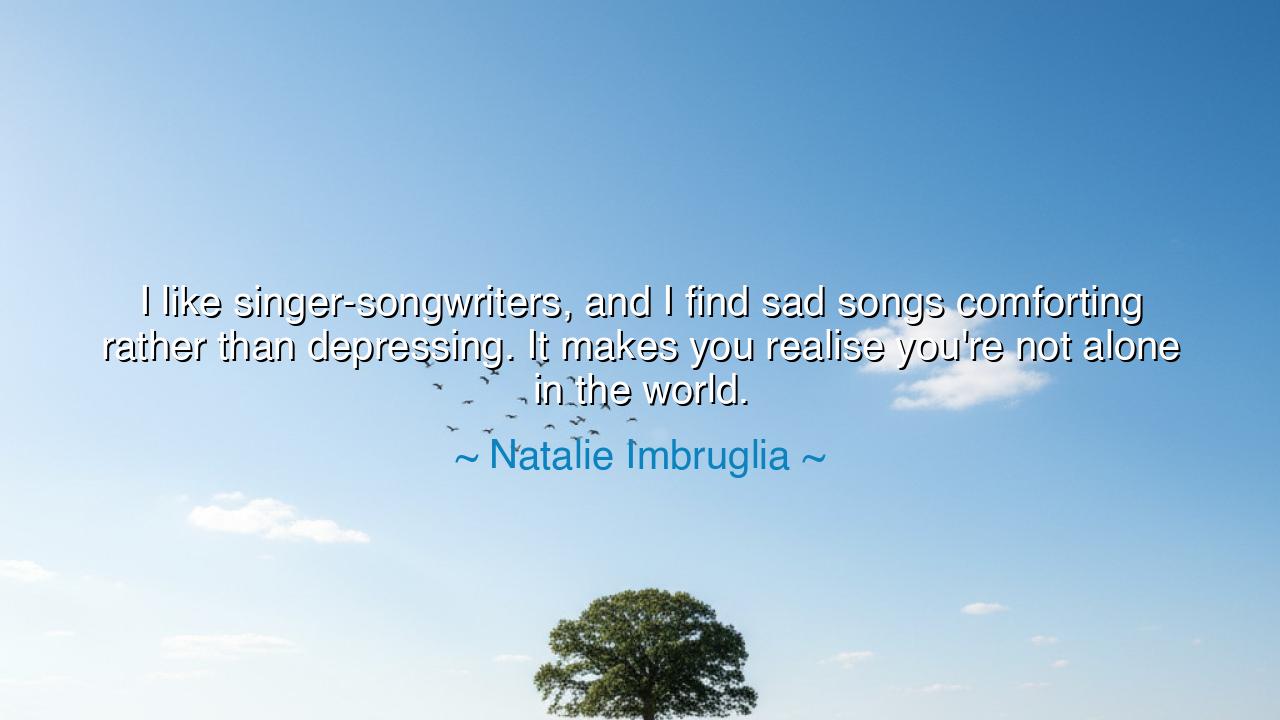
I like singer-songwriters, and I find sad songs comforting rather
I like singer-songwriters, and I find sad songs comforting rather than depressing. It makes you realise you're not alone in the world.






Hear the tender words of Natalie Imbruglia: “I like singer-songwriters, and I find sad songs comforting rather than depressing. It makes you realise you’re not alone in the world.” In this reflection lies the ancient truth of music: that sorrow, when shared, becomes lighter, and that the voice of another can speak into our wounds with a healing power greater than silence. Her words remind us that sadness is not always to be feared, for in the presence of music, sadness becomes a companion, a reminder of our shared humanity.
The power of the singer-songwriter lies in their intimacy. Unlike the grand chorus or the orchestrated spectacle, they bring forth words and melodies that are deeply personal, raw, and unguarded. It is in these personal offerings that we find universality. For when one soul dares to sing of heartbreak, loneliness, or despair, another soul listening feels seen. This is why sad songs comfort rather than depress: they reveal that our pain is not unique, that others have walked the same road, and in their footsteps, we find the courage to keep walking.
The ancients understood this truth. In the lamentations of the Hebrew prophets, sorrow was sung aloud not to deepen grief but to bind a people together in shared mourning. Likewise, the Greek tragedies carried entire cities through their collective struggles, reminding them that suffering was not an individual burden but a universal human experience. In every age, the song of sorrow has been a thread that weaves scattered souls into one fabric of endurance.
History offers us shining examples. Consider the blues, born from the suffering of African Americans under oppression. These songs were filled with grief, loss, and longing, yet those who sang them and those who listened did not sink deeper into despair. Instead, they drew strength from the shared experience, the knowledge that they were not alone. What Imbruglia says of her own love for sad songs is the same that sustained countless people: that to hear another voice sing your sorrow is to be lifted by invisible hands.
There is also wisdom here about the paradox of emotion. Joy, when sung, often belongs to the singer; but sorrow, when sung, belongs to everyone who hears. Sad songs strip away the illusions of separation. They break the pride that says, “I suffer alone,” and whisper instead, “Your suffering is mine, too.” In this way, sadness becomes not an isolating force, but a bridge across hearts.
The lesson for us is clear: do not shun sadness in music, or in life. When you are in sorrow, seek out voices that speak to it. Let them remind you that your wounds are shared, that the burden you carry has been carried by others. When you are in joy, remember that others remain in sorrow, and offer your voice as comfort to them. To give and receive songs of sadness is not weakness, but the truest form of strength, for it binds humanity together.
So let Natalie Imbruglia’s words stand as a guide: treasure the singer-songwriters, treasure the sad songs, for they are not chains that drag us down but lanterns that light our path. In hearing them, we know that no one walks entirely alone. And in singing them, we give voice to the eternal truth—that sorrow shared becomes lighter, and in the communion of song, the human heart finds healing.






AAdministratorAdministrator
Welcome, honored guests. Please leave a comment, we will respond soon